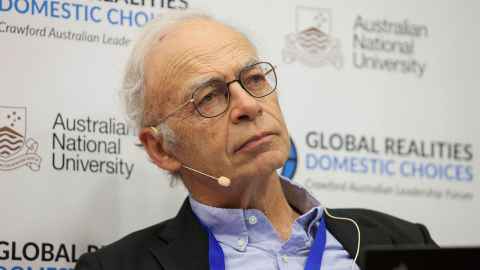The implications of SkyCity’s cancelled speaker
28 February 2020
Opinion: Tim Dare examines what SkyCity's 'de-platforming' of controversial speaker, Princeton Philosophy Professor Peter Singer, might mean for free speech.

In work first appearing in the late 1970s, Princeton Philosophy Professor Peter Singer argued that in a limited range of circumstances parents ought to be able to ask doctors to end the lives of severely disabled newborns. Singer has produced significant work on other topics in ‘practical ethics’, including our ethical obligations to animals, the victims of famine, and to address global poverty.
His work on these other topics has been much more influential than his views on disability, but this latter work has attracted heavy criticism and led SkyCity in Auckland to cancel a booking for a public lecture in June, even though the lecture was to have been not on his views about disability, but about a non-profit organisation he heads that aims to encourage donations to life-saving charities in developing nations.
SkyCity is a private company and can, perhaps, legitimately ‘de-platform’ controversial speakers to protect their brand, subject only to the terms of their own contracts and broad requirements to avoid discrimination.
However, de-platforming has significant free-speech implications. It seems clear that it is sometimes warranted, for the same reasons limitations on free speech itself are warranted – most obviously some speech threatens serious harm. But the content of Singer’s proposed speech was not at issue in the current case. SkyCity used a broad de-platforming principle, not to stop an address that might itself include harmful content, but to limit the speaking opportunities of someone to say anything about anything, because they once said something some people considered offensive.
We might come to have a better understanding of the value of the lives of severely disabled infants by working out why Singer is wrong about them.
It might seem important not to overstate the threat to free speech in this case: It’s easy to read Singer's work and find out about his non-profit. Perhaps what is at issue is merely whether he ought to be given the opportunity to speak to a live audience, perhaps even to be ‘honoured’ by the opportunity to deliver a public lecture.
But there are some obvious worries here.
First, SkyCity’s de-platforming principle could easily be spread to other forums. We already do it with good cause in other cases – for instance, it’s unlawful to publish certain material about the Christchurch shooting on any forum. So if we endorse SkyCity’s de-platforming principle we need to work out its boundaries. Which platforms can we legitimately remove from someone whose proposed expression does not itself trigger limitations of free speech but who once said something else that troubled some people? Are we obliged to preserve any?
Second, restricting ‘speaking in person’ looks pretty close to preventing ‘assembly’ – to stopping people gathering to speak to one another. It’s perhaps instructive that most of the great US freedom of assembly cases are in fact ‘freedom not to assemble’ cases. Shops, businesses, clubs, etc., wanted the freedom to choose who assembled on their premises and to exclude people they found offensive. No doubt some restrictions on the freedom of assembly are warranted too, but it’s hard to imagine we would want to put barriers in the way of most public meetings to speak about important issues, even if they involve people who once said something about something else some find troubling.
Some will think all of this is settled by the fact that SkyCity is a private organisation that can offer and withdraw its premises more or less as it wishes. However, private enterprises that offer venues, not merely for gambling and entertainment, but for the presentation of important ideas, change their role and therefore the values they have to take into account. They’ve taken on a role that has its own underlying values including those that require greater regard for freedom of speech. Private corporate interests are no longer the only ones that matter.
(Of course, there may be a simpler solution. We already have organisations whose legislative and social ‘brands’ include a concern to encourage the free exchange of ideas. One might hope that one of the many universities in Auckland (mine perhaps?) would step in and offer Singer a replacement venue.)
None of this entails that those with genuine concerns about Singer’s views about some disabled newborn should be disregarded. Proper regard should be had for those concerns, and rights to protest should be respected.
My views are of course motivated by a particular view of the importance of the free exchange of ideas.
Singer’s work is often controversial, he writes on contentious, demanding topics. There is no reason to think his arguments are always compelling or his conclusions always correct. However, having read and thought about his views, we are likely to have a better understanding of the topics he discusses even if we reject his views. We might, for instance, come to have a better understanding of the value of the lives of severely disabled infants by working out why Singer is wrong about them.
That’s the power and promise of free expression. We should be careful not to let it go too readily.
We should certainly be careful not to see it become dependent upon the narrow branding concerns of private enterprises or upon excessively broad de-platforming principles.
Professor Tim Dare is from the Department of Philosophy in the Faculty of Arts.
This article reflects the opinion of the author and not necessarily the views of the University of Auckland.
Used with permission from Newsroom The implications of SkyCity’s cancelled speaker 28 February 2020.
Media queries
Alison Sims | Research Communications Editor
DDI 09 923 4953
Mob 021 249 0089
Email alison.sims@auckland.ac.nz